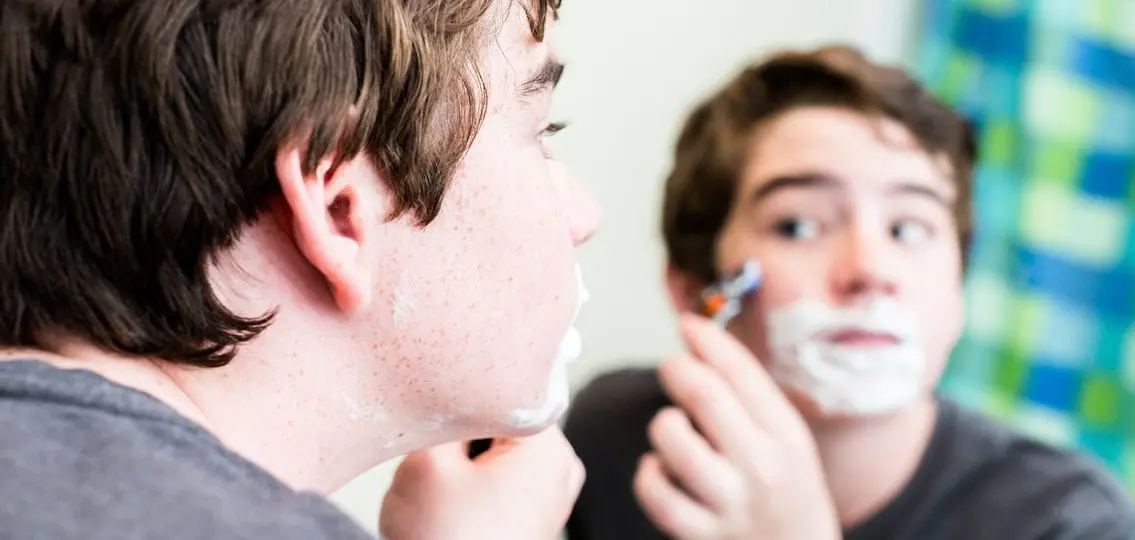When puberty arrives, many parents discover their once sweet smelling baby has been replaced by a stinky adolescent. In this series of four videos, Dr. Ellen Rome, head of the Center for Adolescent Medicine at the Cleveland Clinic, shares what’s normal when it comes to teenagers and smells and what may need more attention. From bad breath to dealing with body odor, how can parents encourage hygiene in teens?

Video #1: The Smell Test
Transcript: When you have a just overall smelly boy, you want to make sure that you’ve got a soap, liquid soap or antibacterial body wash, that works well with their smell. And sometimes that can mean playing with a couple of different ones until it works. You also have the guy thing, which can also be a girl thing, of different degrees of dirty clothes. So, if they’re in the habit of never washing their coat, you may have to make sure that weekly or every other week that coat gets put through the washer and dryer.
Or, train them, even better, to do it themselves. Same way, the clothes that are gently worn versus really worn versus need to get washed versus can walk themselves to the washer and dryer…you’ve got to train them when they’re not passing your smell test. And how to cycle those clothes into the laundry just a little bit faster. Also getting kids to use deodorant well and early enough can be a big thing. Because some kids are starting body odor at seven and a half, eight. Other kids it’s fifteen. So you really just have to kind of take that one as it comes, even if they’re just a little kid.
Video #2: Halitosis (i.e. Bad Breath)
Transcript: We get a lot of questions about kids with bad smell. So we’re going to start head to toe, starting with bad breath. The medical word for that is halitosis. And if you have a kid with halitosis, there’s a bunch of things you can do.
One, make sure they’re good teeth brushers, twice a day. And also getting to the dentist twice a year. When they’re teeth brushing that also means flossing, and that also can mean brushing their tongue if they really have stinky breath. And making sure they brush their teeth the same length it takes to sing happy birthday or ABCs. So that they’re really brushing their teeth for long enough each time. You can also buy them your favorite flavored mouthwash: mint, cinnamon, whichever one you like, and they like. And you can have them use a swish and spit a number of times per day.
Video #3: Feet
Transcript: If bad smells are on feet, that’s a whole different challenge. We have kids that can clear a room just taking their sneakers off. With that kind of a kid, you want to get some anti-fungal powder and put it generously in shoes. You want to have them wash feet with soap and water when they are in the shower or in the bathtub. You want them to make sure they are throwing those sneakers in the washer and then air drying them. Or put them with something like a pillow that you don’t care too much about in the dryer on air fluff, so that the pillow softens them banging around and they don’t kick the dryer door open.
You can also get products such as Sweat-Ex, which deodorizes and sanitizes sneakers, lacrosse and hockey equipment—major place for bad smells—and also gym mats for wrestling. It’s one of the things we’re using for MRSA reduction, when you have the resistant staph aureus infections. Sweat X, that’s a keeper. I would highly recommend that one.
Video #4: Girl Odors
Transcript: Bad girl smells in the vagina area can be a problem that girls will identify and be embarrassed about or mothers may notice and girls don’t. Either way, that’s fixable. You want to make sure they are not using a powder that is irritating and causing a funky smell. You also want to make sure they are not douching because douching does not give you that fresh feeling. Douching actually pushes vaginal bacteria up your uterus and tubes and can introduce infection where it wasn’t before. So, no douching.
You can use a vaginal insert called Vagisil, which acidifies vaginal bacteria a little bit. That can help. Or you can talk to your doctor to figure out whether there an overgrowth of vagina bacteria, something called Gardnerella, or Bacterial Vaginosis, which is treatable with an antibiotic or with a vaginal gel. Ask your doctor to check for it. It can be done with a simple vaginal swab that the kid can do or the doc can do. It’s treated easily.

One other main point on discharge and itching. You want to make sure it’s not Yeast Infection Vaginatis, which is treated differently, or that it’s not Ghonorrea or Chlamydia or other infection. If they are having sex, but haven’t managed to tell you about that, make sure you are getting them to a doctor who is asking private questions and can build that trust and help them access care and be a bridge of communication back to you. If you are 300 percent certain your daughter is not having sex, you can try these over-the-counter solutions. But if there is any doubt that this could be a sexually transmitted infection, you want to get that kid to their doctor ASAP just to make sure it’s not an STI that is treatable and an easy solution to her discharge.




